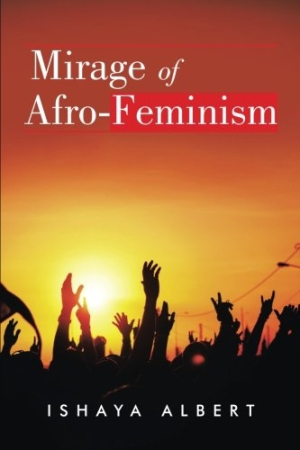Mirage of Afro-Feminism
This is a novel with a lot of heart, whose hope for Nigeria’s women shines through, even if pathways to equality resist definition.
Ishaya Albert’s Mirage of Afro-Feminism is a novella that explores the intersection of women’s interests with bureaucracy in developing African nations. A wide array of characters and situations expose the complexity of female-driven efforts at national modernization.
The novel begins in Mrs. Lawal’s orphanage, an institution that takes in the children of those lost to civil war and poverty, and which survives financially thanks to a generous donation from a stranger. A few quick scenes highlight the challenges such institutions face, from family members who abandon children, thinking they have no better options, to reliance on outside contributors. Brief chapters allow for quick meditations on these subjects, though the plot shifts to a women’s conference just as they are introduced.
The conference features speakers whose arguments seem to be the center of Albert’s novel. Does Nigeria, the country of focus, need to modernize in concert with the Western world, or is concentration on a woman’s maternal duties the path to true gender equity? Disappointments follow for the women when they take too seriously a politician’s declared commitment to gender parity, a theme that recurs to the end. So, too, do the contributions of laymen factor in, particularly via a generous donation from a soldier plagued by guilt for his role in Nigeria’s cultural upheavals.
Though it touches on many interesting points, the novel’s stilting pace sometimes makes for confusing reading. Its time line is hard to grasp, and years can pass in the story without any indication. Narrative turns are swift and don’t always seem as monumental as their allotted space suggests. This is particularly true of a lengthy agricultural junket abroad that mostly serves to render Lawal’s generous benefactor a troubled hero.
Other characters factor in only intermittently, with the driving forces of the first chapter not reemerging later on, and more loquacious characters taking their place. Influential men can sometimes seem to lecture the powerful women they’re working with. A discussion of Gaea, while interesting, may prove to be one deviation too far. By the end, it’s difficult to determine the novel’s precise argument, or even who its most central characters are.
Character dialogue is often well drawn, both vulnerable and inquisitive, though their speeches can drift into preachy territory. There are occasional moments of confusing diction—orphans are called “inmates,” a character waits for sleep to “infest” him.
Mirage of Afro-Feminism may suffer from trying to do too much in a short space, and those intrigued by its arguments will certainly desire lengthier explorations of its key moments. This is a novel with a lot of heart, whose hope for Nigeria’s women shines through, even if pathways to equality resist definition.
Reviewed by
Michelle Anne Schingler
Disclosure: This article is not an endorsement, but a review. The publisher of this book provided free copies of the book and paid a small fee to have their book reviewed by a professional reviewer. Foreword Reviews and Clarion Reviews make no guarantee that the publisher will receive a positive review. Foreword Magazine, Inc. is disclosing this in accordance with the Federal Trade Commission’s 16 CFR, Part 255.

